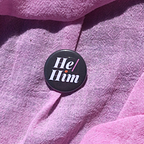The Feminine Trans-Masculine
Some of us struggle not just with our trans identities, but also with backlash for our gender expression
Gender can be, and is, a fluid thing for many people. For me, I’m very confident in who I am- not to say that fluid people aren’t confident. I mean more in the sense that I know in my heart, with all my soul, that I am a man. A trans man. Many would call me ‘trans masculine,’ but to me that just isn’t a label that fits me. Yes, I’m trans. Yes, I’m transitioning to be seen as the male I am. But masculine? I’m not so sure that label sticks.
When I was younger I hated feminine things. I was a ‘tomboy,’ someone you wouldn’t catch dead in a dress. Someone you would never see gussied up in makeup with painted nails. I wore dark colors and my wardrobe wasn’t all that big. I wore the same pair of sneakers every single day. I resented the gender I was assigned at birth and because of that, I despised everything associated with it.
I always knew I wasn’t a girl. When I first learned about nonbinary people, I thought that was what I was. It didn’t feel right the more I thought about the label and myself. Before investigating further, I saw the backlash people got for their gender expression and I locked my identity up then buried it deep down inside myself. I couldn’t be nonbinary. I couldn’t be trans either. I just couldn’t.
Enter my transgender awakening, when I finally decided to explore my feelings. Surprisingly quickly I figured out that I wasn’t nonbinary, but rather simply a trans man. That isn’t to say you can’t be both, however I simply don’t feel correct with the label of ‘nonbinary.’ My whole experience in figuring my gender out isn’t worth entirely exploring for this piece, but someday I might write it up. Needless to say, I finally recognized myself as a man.
It wasn’t until I came to terms with my gender identity that I could express my femininity.
What kind of man was I, though? At first I considered myself very masculine, after all that’s what we’re told a man is supposed to be like, right? But slowly I began to learn that gender expression is completely different from gender identity.
It might seem confusing to many people. I know it was confusing to me at first. Anatomical sex didn’t have to match gender identity already — which was something I’d had trouble understanding. But now I could present in a feminine manner without being a woman? It was a completely alien concept to me. Growing up in a conservative area didn’t help any of this, but slowly I learned these lessons, and with them, I could explore who I was.
All of a sudden, my repulsion to all things feminine simply faded away. In dresses and skirts I felt empowered and sexy because I knew who I was when I wore them. I didn’t have to be scared with the labels society would put on me anymore. I was me, and I was feminine. Makeup, nail polish, and all the beautiful chiffon blouses I bought didn’t lessen my identity.
Despite my own acceptance of who I am, I’m still extremely hesitant to show this part of myself to anyone other than my brother and partner. I’m pre-T and while I can appear masculine to many, my voice gives my assigned sex away.
Is trans-masculine outdated?
I don’t think any labels are exactly ‘outdated’ as long as there’s a group who identifies with it. However, I would urge readers to err on the side of caution when assigning someone with a certain label, even if it’s a popular one. I don’t speak for everyone, and could never; there are too many people with too many stories and too many feelings. Some may feel ‘trans-masculine’ perfectly describes who they are, and that’s ok.
Me however? Simply hearing ‘trans-masculine’ makes me cringe and grit my teeth. I hate how it’s simply a more polite way to identify me as someone assigned female at birth. I’m simply a feminine man, nothing more or less.
